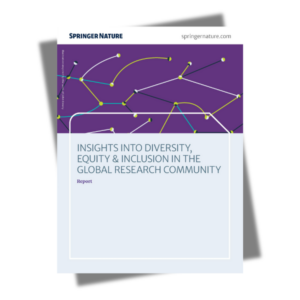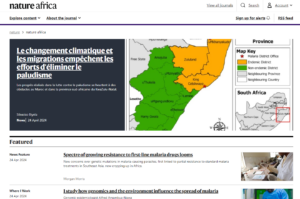Promoting positive change in science with high profile DEI initiatives
Diversity in science
 There’s no doubt that many organizations are working to create a more inclusive and equitable research environment. But as one researcher in a Springer Nature DEI report noted: “People are attending these courses, but it is not having an impact on people…it shouldn’t be a one-off activity. The conversation should keep on going.”
There’s no doubt that many organizations are working to create a more inclusive and equitable research environment. But as one researcher in a Springer Nature DEI report noted: “People are attending these courses, but it is not having an impact on people…it shouldn’t be a one-off activity. The conversation should keep on going.”
Springer Nature’s report, Insights into Diversity, Equity & Inclusion in the Global Research Community, offers insight into the views of almost 5000 scientific researchers from diverse subjects and backgrounds.
By exploring the attitudes of different groups , the report was able to illustrate that majority groups are sometimes less likely to see the challenges that underrepresented researchers experience.
This blog highlights recent partnerships from Springer Nature’s flagship brand, Nature, that champion diversity in science and aim to foster an environment of positive change.
Our partnerships
The Sony Women in Technology Award
With women comprising less than a third of technology roles in the global workforce, the Sony Women in Technology Award, a partnership between Sony and Nature, will recognize three outstanding early- to mid-career women researchers in STEM whose work is making a positive impact on society and the planet.
“Through this new award with Sony, we can provide a global platform to celebrate the work of emerging women researchers and engineers who may otherwise go unheralded,” said Magdalena Skipper, Editor-in-Chief of Nature. “Women who, through their work, are driving positive change for the planet and society need new opportunities to showcase their work and be awarded for it.”
Health equity program
A partnership between Nature and Takeda, a global biopharmaceutical, seeks to provide accessible information about the causes and consequences of health inequities, amplify the voices of those disproportionately impacted by health inequities, and inspire action for initiatives promoting global health equity. Takeda’s multi-channel program comprises editorial and video content, events, and the Inclusive Health Research Awards, celebrating those driving a more inclusive approach to health research.
“Takeda is exceptionally pleased to partner with Springer Nature…to have such a like-minded partner who brings their research, credibility, connections and strategic thinking to address one of the most critical issues of our time” – Linn Parish, Head of Health Equity Alliances and Partnerships at Takeda.
Inspiring Women in Science Awards
The Inspiring Women in Science Awards, a partnership between the Estée Lauder Companies and Nature, support the achievements of women in science, and all those who work to encourage girls and young women to engage with STEM subjects.
Delivering a keynote at an event to honor the 2023 recipients, Melissa Fleming, Under-Secretary-General, Global Communications, United Nations [MT3] noted, “We need to communicate more and better – both about science itself and about the remarkable contributions that women bring in the field.”
Nature Africa
Recognizing that a lot of excellent research from Africa does not receive the coverage it deserves, Nature created Nature Africa, an online magazine dedicated to shedding light on some of these stories and bringing them to a wider, international audience.
 Nature Africa is free to access thanks to the financial support of a consortium of partners: The University of Cape Town (UCT), University of Johannesburg, University of Pretoria, University of the Witwatersrand, Stellenbosch University, and University of KwaZulu-Natal. The magazine launched with a virtual event, “How can Africa empower young researchers to lead a new science renaissance in the continent?”.
Nature Africa is free to access thanks to the financial support of a consortium of partners: The University of Cape Town (UCT), University of Johannesburg, University of Pretoria, University of the Witwatersrand, Stellenbosch University, and University of KwaZulu-Natal. The magazine launched with a virtual event, “How can Africa empower young researchers to lead a new science renaissance in the continent?”.
Partnering with Nature
For nearly two centuries, Nature has helped shaped today’s research landscape. Partnering with us on important topics like DEI in STEM is an authoritative showcase that helps organizations reach a significant global audience. We can collaborate on projects including:
- Supported editorial content to demonstrate your organization’s commitment to a specific area of science or social responsibility.
- Custom content to promote your organization’s products and achievements.
- Awards to celebrate the research and outstanding researchers in the scientific topic you’re passionate about.
- Events to help you set the agenda – literally.
- Regional portals to support local scientific communities by publishing geographically specific research for an international audience.
Our diversity and inclusion projects
At Springer Nature, our commitment to furthering diversity equity, and inclusion goes beyond our external partnerships. We are consistently and diligently working to help science and research achieve the UN’s Sustainable Development Goals and are proud to play an active role in promoting diversity, equity, and inclusion. DEI is a key element of Springer Nature’s mission.
Our projects include: diversifying the sources interviewed in Nature’s content, creating a diversity and inclusion hub to help our editors improve DEI practices in the scholarly community, and diversifying our editorial decision-makers based on our 2023 Editor Diversity report, which analyzed diversity among our 100,000 academic editors.
And of course, we’re publishing lots of content on DEI in science. Examples include: Nature’s special issue, Racism, Overcoming science’s toxic legacy — the first in the journal’s history to be guest edited — investigating how science can make discrimination self-perpetuating and the impact of the lack of diversity among researchers. Nature’s collection, Disability inclusion in chemistry, explores how different disabilities, including deafness and neurodivergence, affect scientific careers. Meanwhile, attendees at Nature’s free conference, Breaking Barriers for Gender and Health Equity Through Research, can expect to discuss healthcare disparities based on gender identity, expression, disability, race, and ethnicity.
DEI in Science, Technology, and Research
When introducing our 2023 report, Insights into Diversity, Equity & Inclusion in the Global Research Community, Sowmya Swaminathan, Director of DEI at Springer Nature Group, stated:
“In order to have a truly diverse global research culture, we must understand and address the specific barriers facing members of this global community.”
Through partnerships, conferences, awards, content, and other exciting initiatives, Springer Nature is working to understand these barriers and overcome the key challenges our respondents identified for creating a more diverse, equitable, and inclusive scholarly community.
To start the conversation about a Nature partnership that can support your mission-focused organization’s commitment to DEI or other Sustainable Development Goals, talk to our team today.



